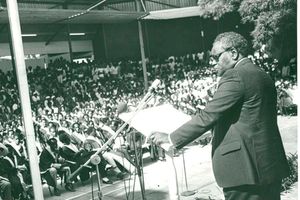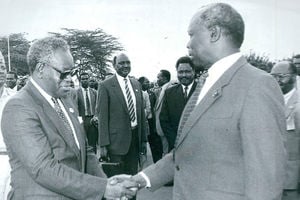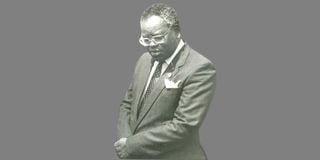
Dr Josephat Njuguna Karanja.
On the turbulent afternoon of April 27, 1989, Dr Josephat Njuguna Karanja, beleaguered and weary, was about to bow to mounting pressure to quit his position as Kenya’s second-in-command. It was a grim and unforgiving day, harsh and unrelenting. The hallowed chambers of Parliament had transformed into a furnace, where Dr Karanja was mercilessly grilled by the entire assembly.
“It is a sad day for Kenya,” he tried to explain as his voice was drowned. “Common decency has been thrown out of the window and regrettably replaced with political thuggery and vindictiveness.”
The die appeared irrevocably cast. The former vice-chancellor of the University of Nairobi stood witness as members of Parliament relentlessly assailed his character, both real and imagined. If any glimmer of hope remained, it pointed in but one direction; an exit.
On 1 May 1989, Dr Karanja resigned from the Kanu party, as Vice-President and as Mathare MP. The reasons for his rapid downfall were unclear but it was loudly stated that Moi’s inner circle was uncomfortable with his independent demeanour and desire to re-organise and control the loyalty of the central Kenya communities. Certainly, he was a man in a hurry.
In 1985, after struggling to gain traction in his native Githunguri constituency, Dr Karanja triumphed in the Mathare by-election, stepping into the shoes of former MP Andrew Kimani Ngumba, who had fled the country. Dr Karanja’s ascent was notably propelled by the formidable Councillor Ndururu Kiboro, a diminutive figure and power-broker. His campaign unfolded during the introduction of the now-famous ‘kobole’, the Sh5 coin, which Karanja is said to have lavishly distributed among eager voters.
In a swift turn of fortune, Dr Karanja metamorphosed into a fervent Kanu stalwart, zealously branding his detractors as adversaries of the Nyayo doctrine while assembling a loyal cadre of followers. With uncompromising fervour, he launched attacks on diplomats. Shortly after ascending to the position of MP and securing his role as assistant minister for Research, Science, and Technology, Dr Karanja audaciously called upon the government to expel the Ugandan High Commissioner, declaring him persona non grata for daring to contradict President Moi. When Dr Karanja touched down in London in 1964, he was quickly hailed by the British press as a rising star, earning the distinction of being the second-youngest diplomat, outshined only by Kuwait's 26-year-old Sheikh Salim. Armed with a doctorate degree in history from Princeton University, Karanja had already cut his teeth in academia with a brief stint at Makerere University, where he met his future wife, Beatrice Nyindombi.
Fast forward to 1970, with the University of Nairobi about to shed its university college status, Dr Karanja was hand-picked as its first vice-chancellor. Despite Professor Bethwell Ogot being the favourite, the power dynamics in Kiambu’s political circles tipped the scales in Karanja’s favour, leading to his recall to replace the outgoing Dr A Porter. While Dr Karanja’s diplomatic finesse and academic prowess had positioned him as a formidable figure, it was in the turbulent world of Kenyan politics where he would meet his match.
Dr Karanja left the academia in 1979 to vie for the Githunguri seat held by Arthur Magugu. It was a bruising battle, and he was among the civil servants who had resigned but lost in the post-Kenyatta general election. Others who had lost were Matu Wamae in Mathira, John Michuki in Kangema, Gachathi in Kiambaa. In 1983, in the Njonjo-scare elections, Dr Karanja attempted to unseat Magugu and failed. It was this time that he shifted to Nairobi’s Mathare constituency where he entered Parliament in the 1986 by-election occasioned by Andrew Ngumba’s flight to exile.
Dr Karanja entered parliament at a time when Moi was hunting for imagined dissidents. He had in November 1986 declared that the party had supremacy not only over Parliament, but also over the judiciary. In Parliament, when debate over judges’ security of tenure came, Dr Karanja told the House they were removing the “anachronistic cobwebs of Colonial era.”
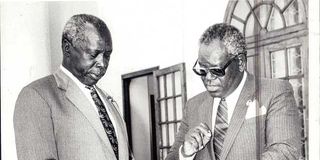
Then President Daniel arap Moi and his vice-president Dr Josephat Karanja during a past function at State House, Nairobi. Dr Karanja died of cancer on February 28, 1994.
It was a period when the Bill of Rights was technically suspended, leaving Moi’s critics without recourse to their constitutional rights. Further, torture had become the main method to extract confessions. Prosecutor Bernard Chunga (later Chief Justice) would haul scared and petrified activists into the courts after hours having passed through a notorious interrogator, James Opiyo, at Nyayo House. In this environment, Mwai Kibaki was demoted to Health minister after the 1988 general elections and Dr Karanja, a virulent Nyayoist, took the position with gusto. Unlike Kibaki who had been marooned in his Nyeri backyard, Dr Karanja started to raise his national profile touring the country and addressing meetings.
On Tuesday, April 25, 1989, Embakasi MP David Mwenje rose and challenged the Vice-President to clear his name amid allegations that he was undermining the position of the President. Mwenje said that after weeks of public speeches about an unnamed leader who was undermining the president, he was now naming Dr Karanja as “the politician everybody is talking about.”
On April 27, on the day President Moi was returning from Tanzania, and after welcoming him at the airport, Dr Karanja rushed back to Parliament and described accusations against him as “false, malicious, and contemptible.” It was his first public reaction after a three-month long chorus of indirect attacks by speakers at weekend rallies led by the Director of Motor Vehicles Inspection Unit, Kuria Kanyingi.
The night before, a meeting of the Nairobi Kanu branch, convened to deliberate on the conduct of the Vice-President, descended into chaos and abruptly ended. Tensions soared as party members threatened to assault David Mwenje, accusing him, according to a report from the Kenya Times, of “taking money from outside forces to destroy Dr. Karanja.”
The assistant minister for Co-operative Development, Kiruhi Kimondo, and his Education counterpart, Fred Omido, were among those accused of conspiring against Dr Karanja. Rumours swirled that they had been gifted cars by an unnamed politician in exchange for their loyalty. Cries of “Mwenje is selling us out!” echoed through the room as emotions flared. Amidst the turmoil, Dr Njoroge Mungai departed, leaving Mwenje to fend for himself in a heated shouting match with his critics. Dr Karanja had prepared a one-page statement that summarised the pain he was going through. He said: “In view of what transpired here in the House yesterday, when the Member for Embakasi mentioned my name, I wish to make a personal statement.
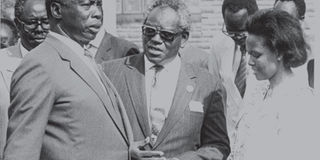
From left, former President Daniel Moi and his vice-president Dr Josephat Karanja with his wife at the Jomo Kenyatta International Airport when seeing off visiting Head of States in 1988 following the Independence anniversary celebrations. PHOTO | FILE | NATION MEDIA GROUP
“This is a sad day for our beloved country. Common decency has been thrown out of the window. It has regrettably been replaced by political thuggery and vindictiveness. “The so called charges against me are totally false and malicious, tendentious and contemptible. These baseless allegations have been hatched and orchestrated by my known political enemies and rivals.
“As a matter of personal honour, I have no intention here in the House or elsewhere to offer any so-called defence against these blatant falsehoods. My loyalty to his Excellency the President is total and unquestionable. My patriotism is beyond reproach. God is my witness, and here I stand.”
The previous Sunday in Kiambu, a meeting which brought together Kiambu, Kirinyaga and Muranga politicianms among them Joseph Kamotho, Arthur Magugu, and James Njiru asked the locaks to reject the vice president “if he wanted to divide the people.” Similar meetings had taken place in Nandi Hills where Mark Toom chairman of Kanu Nandi branch, had hosted Kuria Kanyingi and Arthur Magugu. On April 27, parliament passed a motion of co confidence in Dr Karanja after he refused to withdraw his previous statement.
Earlier, Mwenje laid out a series of serious allegations against Dr. Karanja, claiming he had “failed to denounce Uganda’s bombing of Kenya, meddled in the politics of Githunguri, and incited the Kikuyu people by warning them of their impending destruction. He even declared himself acting president in President Moi’s absence and boasted of his influence over ministerial appointments.”
Mwenje further accused Dr Karanja of engaging in magendo—illicit dealings—by approving the importation of overpriced fertilisers, which he claimed were forcibly sold to the Kenya Tea Development Authority (KTDA). While the fertilisers were worth Sh100 million, Mwenje alleged that KTDA was coerced into buying them for Sh120 million.
He also attacked Dr Karanja’s character, accusing him of arrogance. According to Mwenje, the Vice President had called him "an idiot" on the very day he mentioned Dr. Karanja in the House. Karanja, however, had merely sought to clarify his use of the phrase "political thuggery," explaining that it referred not to Parliament, but to what he called “a political circus in Kiambu District.” Foreign Affairs minister Robert Ouko accused Dr Karanja of arrogance. Mwea MP Kibugi Kathigi accused Dr Karanja of trying to divide leaders in Central Province, For his part, Arthur Magugu claimed that Dr Karanja had tried to interfere with the judiciary by influencing them to jail David Mwenje for six months over an assault charge.
“As late as two days ago at the Muthaiga Club, the VP said our president had no alternative but to give him the VP as a gesture of gratitude to the late President Kenyatta who had appointed him (Moi) vice-president. Honourable Chris Kamuyu was there,” alleged Magugu. Dr Karanja had no chance. Finally, he quit.
@johnkamau1
Tomorrow: When Vice President George Saitoti was poisoned


